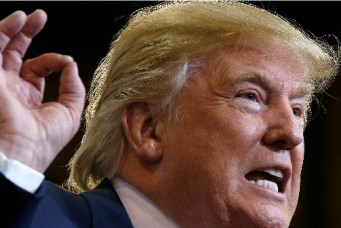Will Trump and El-Sisi Avert a Proven Disaster?
I think we should all be very worried about the tone and direction of Trump’s apparent views on how the United States should pursue its relations with Egypt.
Despite all the negative gestures and statements he has made in the past eighteen months, my personal and journalistic instinct is to see what U.S. President Donald Trump actually defines and implements as policies before judging him conclusively. That should take just a month or two at most, given the brisk pace of his bold actions and rhetoric. It is fair game, though, to react to what he is doing and saying these days in situations where any of us can offer insights based on experiences that he may not have had himself.
So I think we should all be very worried about the tone and direction of Trump’s apparent views on how the United States should pursue its relations with Egypt. I say this only on the basis of what the White House spokesman said Monday when he reported that Trump had spoken by phone with Egyptian President Abdel Fattah El-Sisi, and that the lead issue in their discussions was “efforts against terrorism and extremism.”
The White House and the Egyptian media both said that Trump praised Egypt’s efforts to fight terrorism, and promised to fully support Egypt in its economic and security plans. It is good news that one of the most important Arab countries and the world’s most powerful country both plan to cooperate in the critical battle against terrorism and extremism. It is imperative that Arab and global powers work closely together to defeat this serious and growing terror threat to all countries, by adopting strategies that could succeed.
Yet, Arab and American leaders (and Russian, British, French and other world leaders) who have tried this have yet to find those strategies that succeed. The main reason may be that they continue to refuse to acknowledge that sustained domestic autocracy devoid of citizen political rights, combined with socio-economic stagnation and growing disparities, actually generate the conditions that promote terrorism among Arab citizens who had never been inclined to this sort of criminality before.
It would be frightening news if Trump’s announcement means the United States plans to fully support El-Sisi’s current strategy to fight terror, because that strategy has failed to date on both the developmental and the security levels. Even more problematic—the lessons of modern Arab history indicate—is the proven reality that the total support of global powers to autocrats, dictators, or military men who rule Arab countries has been a recurring catastrophe for the our region for sixty-five years now.
This started when the Egyptian military in 1952 initiated the ugly legacy of soldiers seizing power and ruling with a devastating combination of heavy-handedness and incompetence. The good things some of them did ultimately were dwarfed and swamped by the negative consequences of unchecked military rule. The novelty of soldiers in power spread from Egypt to many other Arab countries after 1952. The results we see today include the weakened national skeletons of once promising countries like Iraq, Libya, Syria, Yemen, Sudan, Somalia, and others.
The new Trump administration should definitely support Egypt’s desire to fight terrorism, but it should do so while recognizing that the sustained combination of unquestioning American support and unchecked Arab military rulers has been one of the most important underlying causes of the country wrecks and security threats that we see across many Arab lands today, including Al-Qaeda and the “Islamic State.” Our own lived history suggests that Egypt’s current policy of using massive military tactics to suppress the small, home-grown terror movements that threaten it, while stifling the political freedoms of all citizens, is unlikely to succeed in the long run. Many other military-run, foreign-supported Arab states have tried the same things in recent decades, and now they are the world’s leading generators, trainers, and exporters of terrorism. Do foreign powers that understandably support Arab autocrats in the fight against terror simply ignore this reality of the past sixty-five years?
The real challenge here is for the Trump administration and Arab leaders to put away their egos and, in some cases, their political desperation, and think rationally and honestly about what happened from the 1950s until today in many Arab lands that routinely exhibit barbarism and cruelty. Heavy-handed local military responses to sustained citizen discontent and rights denials eventually prompt small groups of politically and economically ravaged individuals who see no hope for improvements in their lives to adopt violence, and then terrorism. More strong American support for Egypt’s stringent security policies and blanket prohibition of any meaningful opposition will almost certainly see this legacy confirmed and repeated—to the great detriment of all Egyptians and all of us, wherever we live.
Terrorism is not a structural or cultural certainty. It is a symptom of underlying distress and distortions that are the consequence of bad policies. Those bad policies include security-first approaches to reducing terrorism, rather than combining police and security operations with serious political reforms and socio-economic expansions. Trump and El-Sisi would seem to be the perfect candidates to adopt this more sensible, rational approach to the terror threat they must address. They may be signaling exactly the opposite, which would be a terrible tragedy for us all.
Rami G. Khouri is a senior fellow at the American University of Beirut and the Harvard Kennedy School. On Twitter: @ramikhouri.
Copyright ©2017 Rami G. Khouri — distributed by Agence Global



